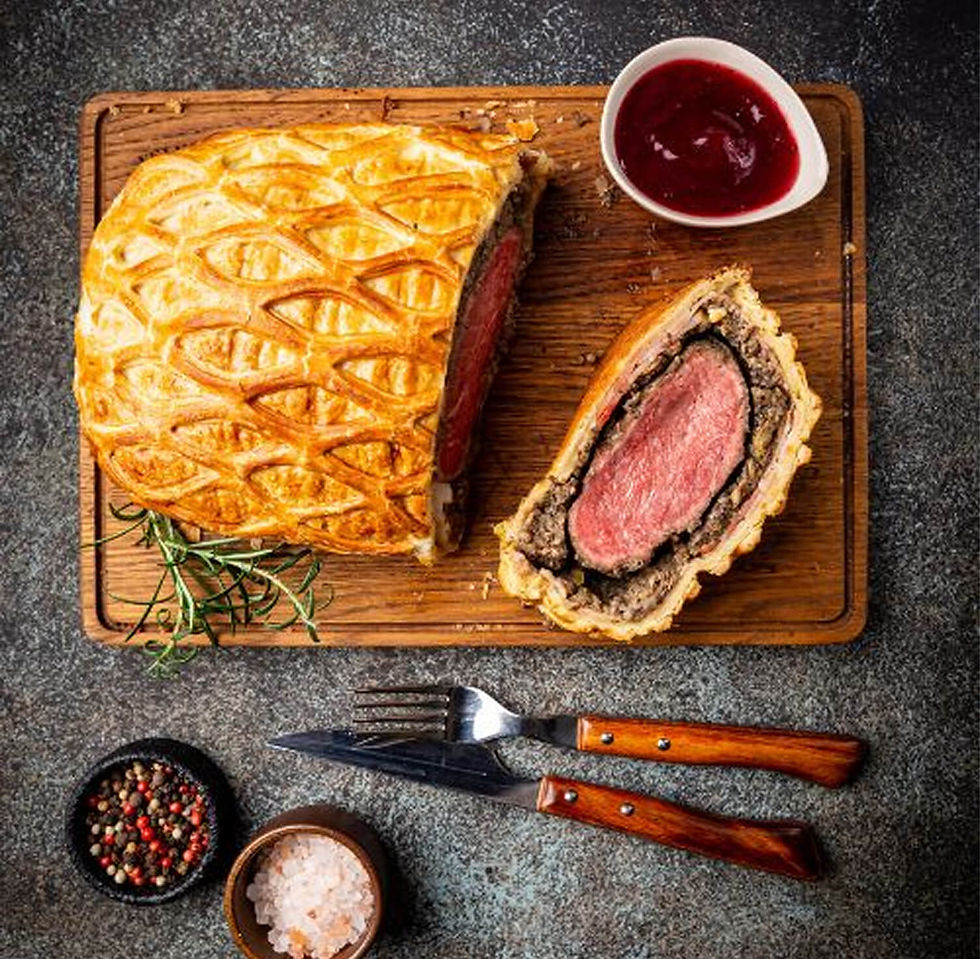Let’s Reduce, Reuse Foodie Waste!(Featuring Wayne from Urban Farms Recycling)
- Chef Rod

- Mar 28, 2025
- 5 min read
Updated: Mar 29, 2025

Hey, Skinny Readers! I hope you’ve all had a fantastic and blessed week. Welcome back to another epic edition of the Skinny Chef Diaries Weekly Blog!
Guess what? Today marks the 40th edition of this blog! 🎉 Wow—time flies when you're doing what you love. And let me tell you, I still have plenty of juice left in the tank! Since launching this blog 40 weeks ago, I’ve grown in so many ways, and my podcast is brewing! I can’t wait to revisit our incredible guest interviews—and bring you even more exciting conversations in the future!
So, let’s dive straight into this week’s topic!
Let’s Talk About Food Waste & Why Reusing It Matters
This is a big one, Skinny Readers! So let me ask you:
👉 How much food waste piles up in your home each week?👉 What do you do with your food scraps?

Here’s the harsh truth: A huge chunk of landfill waste is organic matter—food waste. And when food gets buried in a landfill, it decomposes anaerobically (without oxygen), releasing methane—a greenhouse gas that’s 25 times more harmful than carbon dioxide!
And food waste isn’t just that week-old leftover beef curry you toss out. It’s also fruit and vegetable peels, rinds, and scraps—things we throw away without a second thought.
But don’t worry! Here are some quick Skinny Chef hacks to repurpose your food scraps:
✅ Stale Bread? Don’t trash it! Blitz it in a blender for breadcrumbs, or cut it into cubes, microwave them, and—boom—homemade croutons!
✅ Leftover Lemon Peels? Toss them into your stinky garbage disposal to neutralize odors, or use the squeezed halves to scrub your stovetop for a sparkling clean finish!
Now, let’s take this conversation to the next level! This week, I’m featuring a very special guest—a true expert in food recycling.
Meet Wayne from Urban Farms Recycling! He’s here to share insights on how we can turn food waste into valuable resources. Let’s get into it!
Skinny Chef x Wayne from Urban Farms Recycling

Skinny Chef: Thanks for taking the time to chat with me and our readers, squire! Tell us—who is Wayne, and what’s your passion?
Wayne: Thanks for having me, Chef Rod! I’m Wayne Harpur, the founder and MD of Urban Farms Recycling, a company dedicated to transforming food waste into valuable resources.
My passion lies in sustainability and environmental stewardship—using natural processes to solve urban waste challenges. I’ve always been a foodie and started growing my own vegetables and fruit about 15 years ago. That got me interested in composting my household food waste into compost and vermicast (earthworm poop!) at home.

Out of this passion, an opportunity to start a business was born. Today, we use large-scale aerobic composting and earthworm-powered vermiculture systems to convert urban food waste into nutrient-rich compost and vermicast—improving soil health and supporting a circular economy.

Skinny Chef: Wow, that’s amazing, Wayne. Great intro! Tell us about the process—how do you use the food waste you collect from different establishments?
Wayne: At Urban Farms Recycling, we collaborate with a variety of establishments—including restaurants, corporate offices, shopping malls, hospitals, and schools—to collect food waste that would otherwise end up in landfills.
The process works like this:
1️⃣ Source Separation – We help businesses separate food waste from other recyclables.
2️⃣ Bokashi Treatment – The waste is treated with bokashi, an anaerobic fermentation process that prepares it for composting.
3️⃣ Composting & Vermiculture – Finally, we use aerobic composting and introduce earthworms to break down the organic matter into high-quality compost and vermicast, a potent organic fertilizer.
Skinny Chef: What benefits come from recycling food waste?
Wayne: Recycling food waste offers numerous environmental and economic benefits:

✅ Reduces Landfill Waste – Diverting food waste reduces methane emissions and helps combat climate change.
✅ Boosts Soil Health – The compost and vermicast we create enrich soil with essential nutrients, improving plant growth without the need for chemical fertilizers.
✅ Promotes Sustainability – By closing the loop on food waste, we encourage eco-friendly agricultural practices.
✅ Creates Jobs – Our business provides employment opportunities for young South Africans, boosting the local economy while making a real impact!
Skinny Chef: Wow! What advice would you give to readers who want to start a career in food waste recycling?
Wayne: If you’re passionate about food waste recycling and sustainable agriculture, here’s my advice:
📚 Educate Yourself – Learn about composting, soil science, and waste management through research, workshops, and online courses.
🌱 Start Small – Try composting at home or within your community to understand the basics of organic waste recycling.
🤝 Network – Connect with local environmental groups, farms, and sustainability businesses to gain knowledge and opportunities.
💪 Stay Committed – This field requires dedication, but the positive impact on the environment and community makes it all worthwhile!
Skinny Chef: Do you have any personal daily health routines?
Wayne: Yes! Running a business, especially one in sustainability, requires focus and energy. Here’s what works for me:
🥦 Eat Well – I focus on locally sourced, organic food and grow my own seasonal herbs and veggies.
🏃♂️ Stay Active – Whether I’m managing our recycling facilities or keeping up with my two young kids, I stay constantly on the move! I’d love to get back into formal exercise and sports in 2025.
Skinny Chef: What’s your favorite food?
Wayne: I love all food! But my favorite meals are those made with locally grown, organic ingredients. Eating fresh, farm-to-table food is not only healthier for me but also better for the planet!

Skinny Chef: Great stuff! Thanks again, Wayne—I truly appreciate the important and inspiring work you do!
Fun Fact! 🎉
Wayne and I have known each other for three years… and guess what? We’ve NEVER met in person! 😆 All our conversations have happened on WhatsApp—including this interview!
But let me tell you something—I’ve been working on my mind movies, and I can’t wait to finally have Wayne on my podcast for a one-on-one chat—and maybe even a little cook-up in the kitchen! 👨🏽🍳🔥
That’s a wrap, Skinny Readers! Thanks for tuning in. Until next time—
Stay safe. Stay healthy. And most importantly… stay Skinny! Haha! 😆
Same time, same place—see you next week!
Creative Director: Shadre Leonard
1
Searing the Beef
Sear beef fillets on high heat for 2 minutes per side to form a golden crust. Let it cool before proceeding to keep the beef tender.
1
Searing the Beef
Sear beef fillets on high heat for 2 minutes per side to form a golden crust. Let it cool before proceeding to keep the beef tender.
1
Searing the Beef
Sear beef fillets on high heat for 2 minutes per side to form a golden crust. Let it cool before proceeding to keep the beef tender.
1
Searing the Beef
Sear beef fillets on high heat for 2 minutes per side to form a golden crust. Let it cool before proceeding to keep the beef tender.
Notes



1
Season the good fresh beef fillets with salt and black pepper. Heat olive oil in a pan over high heat and sear the fillets for 2 minutes per side until it fully browned. Remove the beef from the pan and brush with a thin layer of mustard. Let it cool.



1
Season the good fresh beef fillets with salt and black pepper. Heat olive oil in a pan over high heat and sear the fillets for 2 minutes per side until it fully browned. Remove the beef from the pan and brush with a thin layer of mustard. Let it cool.



1
Season the good fresh beef fillets with salt and black pepper. Heat olive oil in a pan over high heat and sear the fillets for 2 minutes per side until it fully browned. Remove the beef from the pan and brush with a thin layer of mustard. Let it cool.



1
Season the good fresh beef fillets with salt and black pepper. Heat olive oil in a pan over high heat and sear the fillets for 2 minutes per side until it fully browned. Remove the beef from the pan and brush with a thin layer of mustard. Let it cool.
Instructions
Quality Fresh 2 beef fillets ( approximately 14 ounces each )
Quality Fresh 2 beef fillets ( approximately 14 ounces each )
Quality Fresh 2 beef fillets ( approximately 14 ounces each )
Beef Wellington

Beef Wellington
Fusion Wizard - Rooftop Eatery in Tokyo
Author Name

Beef Wellington is a luxurious dish featuring tender beef fillet coated with a flavorful mushroom duxelles and wrapped in a golden, flaky puff pastry. Perfect for special occasions, this recipe combines rich flavors and impressive presentation, making it the ultimate centerpiece for any celebration.
Servings :
4 Servings
Calories:
813 calories / Serve
Prep Time
30 mins
Prep Time
30 mins
Prep Time
30 mins
Prep Time
30 mins



Comments